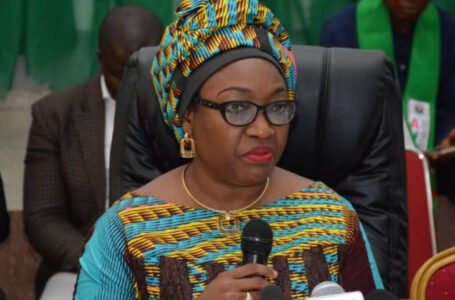Witness narrates how Ex-HoS, allies diverted public funds to private companies in court
Strike: Why we rejected FG’s offer –ASUU


By Ibrahim Adeleke
The Academic Staff Union of Universities (ASUU) has explained that Tuesday’s meeting with the Prof. Nimi Briggs Committee renegotiating the 2009 agreements with lecturers on behalf of the Federal Government ended in a deadlock because it rejected the award of a recommended Consolidated University Academic Salary Structure (CONUASS) prepared by the National Salaries, Incomes and Wages Commission.
According to the union, it was presented by the committee in a “take-it-or-leave-it on a sheet of paper”.
ASUU President, Prof Emmanuel Osodeke, in a statement yesterday said the ‘award salary’ was “against the principle of collective bargaining, based on the Wages Boards and Industrial Council’s Decree No 1 of 1973, the Trade Dispute Act (1976), ILO Conventions 49 (1948), 91(1950), 154 (1988) and recommendation 153 (1981), Udoji Commission Report of 1974, and Cookey Commission Report of 1981”.
Meanwhile, the Federal Government said its decision to stick to its no-workno- pay policy is the only reason why public university lecturers have yet to call off their strike.
ASUU asked its members to down tools on February 14 after the Federal Government failed to honour its 2009 agreement with them.
Osodeke accused the government of insincerity in its approach to resolving the lingering crisis, demanding that the Ministry of Education should return to the New Draft Agreement of the 2009 FGN/ASUU Renegotiation Committee, whose work, according to him, “spanned a total of five and half years as a demonstration of good faith”.
He said: “Government imposed the ongoing strike action on ASUU and it has encouraged it to linger because of its provocative indifference.
“The Munzali Jibril-led Renegotiation Committee submitted the first Draft Agreement in May 2021 but the government’s official response did not come until about one year later! Again, the ‘Award’ presented by the Nimi Briggs-led Team came across in a manner of ‘take-it-or-leave-it on a sheet of paper’. No serious country in the world treats their scholars this way.
“Over the years, particularly since 1992, the union has always argued for and negotiated a separate salary structure for academics for obvious reasons.
“ASUU does not accept any awarded salary as was the case in the administration of General Abdulsalam Abubakar. The separate salary structures in all FGN/ASUU Agreements were usually the outcome of Collective Bargaining processes.
“The major reason given by the Federal Government for the miserly offer, a paucity of revenue is not tenable.
“This is because of several reasons, chief of which is poor management of the economy. This has given rise to leakages in the revenue of governments at all levels.
“ASUU believes that if the leakages in the management of the country’s resources are stopped, there will be more than enough to meet the nation’s revenue and expenditure targets without borrowing and plunging the country into a debt crisis as is the case now.
“At the commencement of the renegotiation of the 2009 FGN/ASUU Agreement on 16th March 2017, both the Federal Government and ASUU teams agreed to be guided by some terms of reference.
“ASUU, however, expressed regret that the former reneged on its side to abide by the agreement. “Government’s surreptitious move to set aside the principle of collective bargaining, which is globally in practice, has the potential of damaging lecturers’ psyche and destroying commitment to the university system.”
But speaking at the weekly Ministerial Media Briefing organised by the Presidential Communications Team at the Presidential Villa yesterday, the Minister of Education, Adamu Adamu insisted that the government would not accept the lecturers’ demand to be paid for the six-month duration of their strike. According to him, President Muhammadu Buhari rejected the request when he presented it to him.
Adamu said: “All contentious issues between the government and ASUU have been settled except the request for members’ salaries for the period of the strike be paid, a demand that Buhari flatly rejected.”
The minister said the President’s position had been communicated to the lecturers.
According to him, the rejection was to curb the excesses of trade unions wanting their members to be paid for work not done.
Adamu also said the University Transparency and Accountability Solution (UTAS) payment system proposed by ASUU actually outscored the Integrated Payroll and Personnel Information System (IPPIS) in use by the government and which the lecturers are kicking against.
However, he said the IPPIS had been upgraded to accommodate the payment of those lecturers on sabbatical.
Adamu denied that the UTAS had been adopted by the government as the new payment platform. According to him, the government has proposed a new salary structure for the striking university-based unions. He said the Senior Staff Association of Nigerian University (SSANU), Non- Academic Staff Union of Universities and Allied Institutions (NASU) and the National Association of Academic Technologists, (NAAT) have accepted in principle and consulting with their members with a view to calling off their strikes.
The minister said ASUU should be held responsible for causing pain to the students and wasting their time. Asked how the government intended to compensate the students for time wasted, Adamu said any of the aggrieved students could sue ASUU for damages.
He said: “We are doing everything humanly possible to conclude the negotiations.
“It is our hope that the outcome of the renegotiations will bring lasting industrial peace to our campuses. In the meantime, I am sure that the current efforts would yield the desired results and return our children to school.”
According to him, the Buhari administration has spent N6, 003,947,848,237 in capital and recurrent expenditure in the education sector in seven years.
He said this was in addition to interventions from TETFund and UBEC amounting to N2.5 trillion and N553, 134,967,498 respectively in capital investment.
The minister said the number of out-of-school children has dropped from an estimated 13 million to 6.9 million, with an impressive enrolment from online states of Kano, Kaduna, Katsina, Sokoto, Gombe, Bauchi, Adamawa, Taraba, Rivers and Ebonyi.









